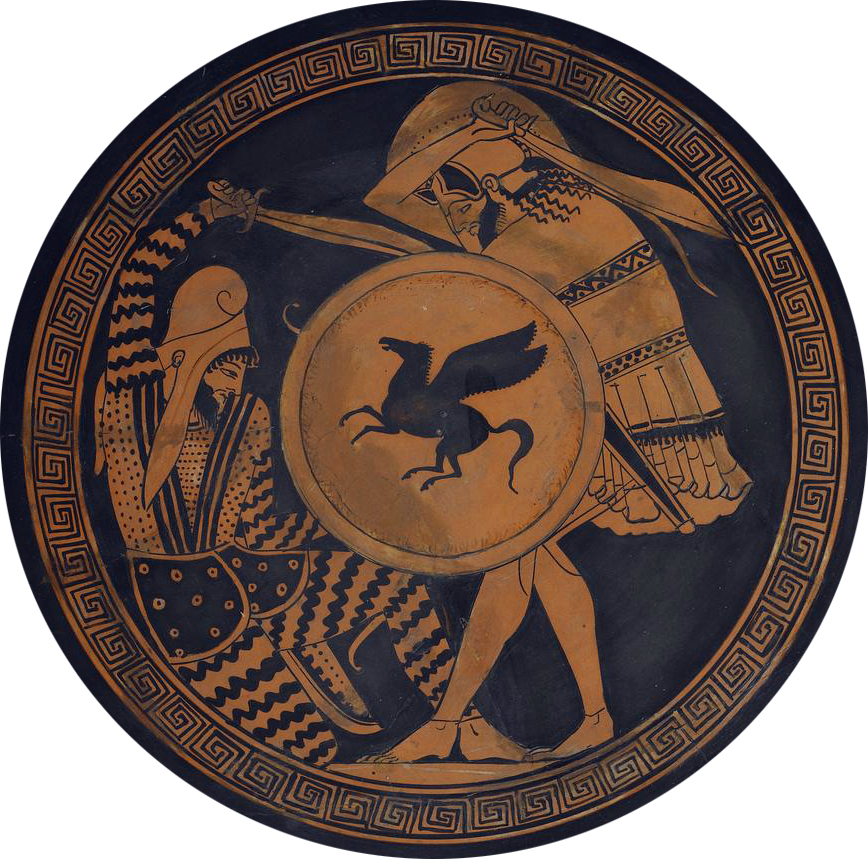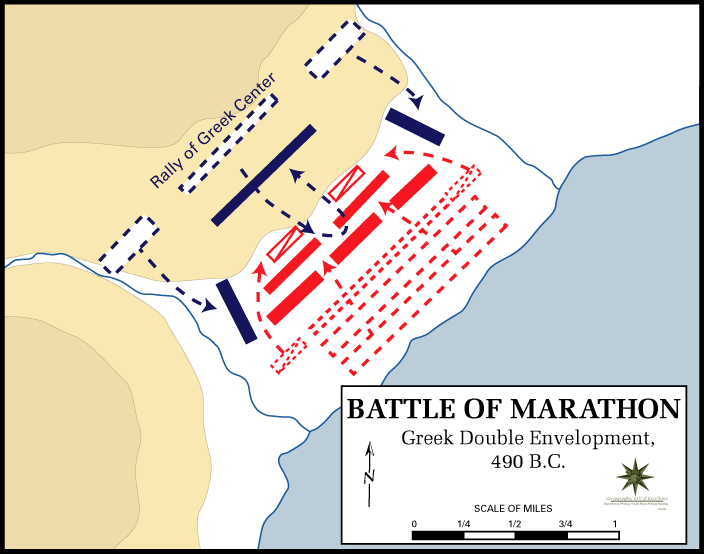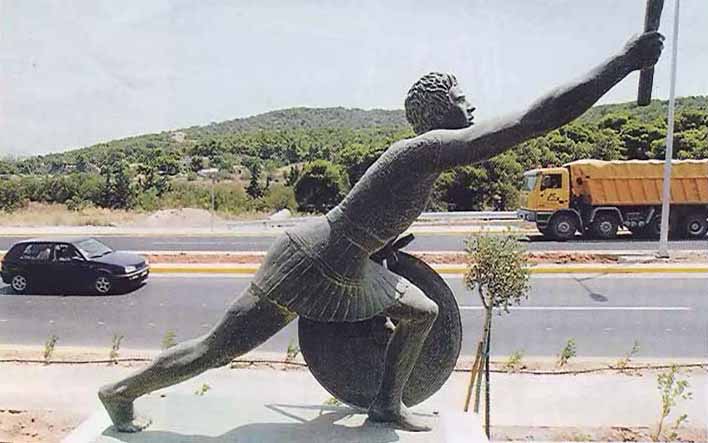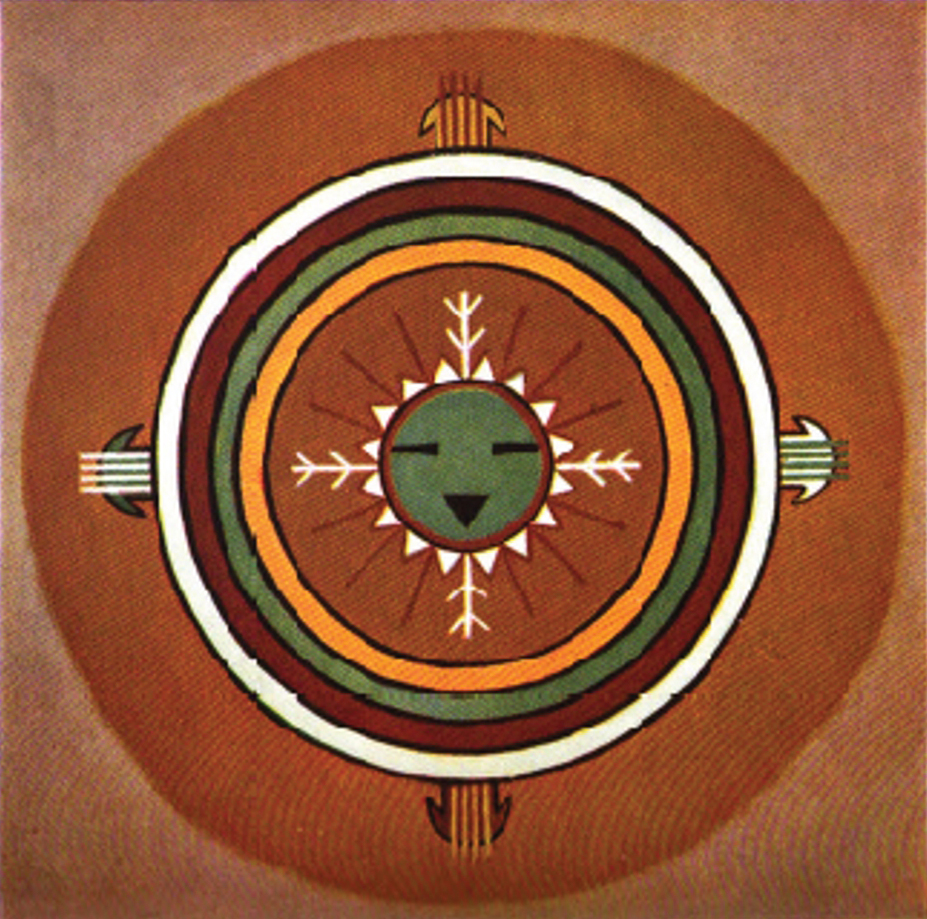
Persian Warrior (Left) and Greek Warrior (Right) in a Duel
Topics on the Page
Overview
Battle of Marathon
Battle of Thermopylae
Xeres the Great
History of Marathon
Festival of Hera
The Boston Marathon
Native American Runners in the Boston Marathon
CROSS-LINK: Herodotus and the Beginning of History Writing
Overview
 John Green's Crash Course video on the Persians and Greeks provides an overview of life in Persia in comparison to the Greeks as well as a look at both the Persian and Peloponnesian Wars.
John Green's Crash Course video on the Persians and Greeks provides an overview of life in Persia in comparison to the Greeks as well as a look at both the Persian and Peloponnesian Wars.
- The Persian Wars brought different city states together (because they had to work together to fight, which in turn helped them see what they had in common with each other).
- For the Greeks, the experience of coming into contact with people who were different from them helped them to form their own identity.
- The Greeks felt great pride in their victories against such a great empire. The Persian Wars helped to perpetuate and inspire the growth of Greek culture. They influenced scholarship and theater. For example, the wars were the subject of what is considered the first written history by Herodotus and themes of morality and war also appeared in theater.
Web-based activities about the Persian Wars, including an interactive map of the battlefield of Plataia, maintained by the British Museum.
 Overview of lesson and activities in order to develop the understanding of the differences between the city states of Athens and Sparta.
Overview of lesson and activities in order to develop the understanding of the differences between the city states of Athens and Sparta.
CROSS-LINK: Athens and Sparta
Battle of Marathon

At the end of the 6th century B.C.E., Athens and Sparta had some minor conflicts with Lydia and Sardis, which were under the control of the Persian empire.
As often happens, Persia wanted revenge and attacked Athens.
This attack happened at Marathon in 490 B.C.E under King Darius, and it is considered the most famous battle of the Persian Wars. Greece won, but if it hadn’t it could have been colonized by Persia.
Battle of Marathon
The Battle of Marathon was hugely significant for Greece. But Persia, because it was such an enormous empire, considered it a small loss. Persia did seek revenge 9 years later under the new leadership of Xerxes in 481 B.C.E.
- Athens was prepared for the attack because they spent many years building up their navy, and they were again victorious against Persia.
- Africans were among the soldiers that fought in the battle of Marathon against the Greeks. Learn more about 'Black' Africans in Ancient Greece Here.
Iron arrowheads and spearheads from Thermopyle

Battle of Thermopylae
- The Battle of Thermoplyae was another important moment in the course of the Persian Wars.
- In this battle, King Leonidas of Sparta faced off against the Persian Army of several hundred thousand with his original Royal Bodyguard of 300, and was supplemented along the way with anywhere from 4-8,000 additional troops before facing the Persians, though estimates usually sit at about 7,000.
- A defeat for the Greeks but successfully stalled the Persians from advancing quickly,
which was the main goal.
- Watch this digital reenactment of the battle of Thermopylae with expert analysis.
Xerxes The Great
The History of Xerxes the Great
- The last battle of the Persian Wars: The Battle of Platea was in 479 BC. In this battle, the Spartan king Pausanias led Greece against remaining Persians in the area. Most significant in this battle was the killing of Mardonius, a leader of the Persian army.
 Ancient Greek plays, oral histories, and texts by ancient Greek and Roman historians are important primary sources for Greek history. An archive of some texts pertaining to the Persian Wars can be found here.
Ancient Greek plays, oral histories, and texts by ancient Greek and Roman historians are important primary sources for Greek history. An archive of some texts pertaining to the Persian Wars can be found here.
The History of Marathons
Statue of Pheidippides along the Marathon Road

The marathons that we know today have their origins in the Battle of Marathon.
- Marathons are based on the famous run of a messenger named Pheidippides.
- It is said that he ran from the battlefield of Marathon to Athens, supposedly running into the god Pan on his way back to announce Greek victory.
- He then ran to Sparta to ask for help and ran all the way back. There is also a story that he collapsed and died after the conclusion of his journey, though this is not supported by any ancient source.
- This long journey inspired the marathon in 1896 in the first Olympics in Athens. Marathons as we know them have been around since.
- Marathon is a Greek word that means fennel and the city of Marathon is a place that had an excess of fennel plants. The actual distance from the Battle of Marathon to Athens, that Pheidippides ran, is around 24.85 miles.
The Real Pheidippides Story, Runner's World (December 6, 2016)
Festival of Hera
Women were allowed to participate in their own athletic events during the Festival of Hera .
Only unmarried women were allowed to participate.
For more see Games for Girls
Boston Marathon Women Runners (2019)

The Boston Marathon
History of the Boston Marathon- The longest running annual marathon
FUN MASSACHUSETTS FACT: The success of the marathon event at the Olympics sparked Boston to hold its first marathon on April 19, 1897.
The Boston Marathon is the oldest annual marathon in the world.
Native American Runners and the Boston Marathon
 Native American runner Ellison Tarzan Brown won the Boston Marathon in 1936 and 1939
Native American runner Ellison Tarzan Brown won the Boston Marathon in 1936 and 1939
Thomas Longboat won the Boston Marathon in 1907.
The Importance of Running in Native American Culture, Women's Running (February 25, 2019)
For Young Native Americans, Running Is a Lesson in Their Own History, The Christian Science Monitor (January 15, 2019)
 In 1967, Kathrine Switzer was the first women to run the Boston Marathon, and the whole drama of the event with the race director chasing after her was caught on camera!
In 1967, Kathrine Switzer was the first women to run the Boston Marathon, and the whole drama of the event with the race director chasing after her was caught on camera!
Sources:
Hooker, Richard (1996). The Persian Wars. Retrieved March 24, 2007, from Washington State University Web site: http://www.wsu.edu/~dee/GREECE/PERSIAN.HTM
Martin, Thomas R. (Date Unknown). Clash Between Greeks and Persians: The Beginning of the Persain Wars. Retrieved March 24, 2007, from The Perseus Digital Library Web site: http://www.perseus.tufts.edu/cgi-bin//ptext?doc=Perseus%3Atext%3A1999.04.0009&query=head%3D%23116
Apostolos Greek Tours, (Updated March 26th 2007). Athens Marathon. Retrieved March 26, 2007, from Athens Marathon Web site: http://www.athensmarathon.com/marathon/history.html
Papaktriakou, Ellen, (Updated October 15th 2011). "Ancient Greek Cities." Retrieved February 5th, 2011 from web site:
http://www.sikyon.com/index.html
Schrader, Helena, (Updated May 2011). "The Wife of Leonidas" Retrieved February 6th, 2011 from web site:
http://sparta-leonidas-gorgo.com/gorgo.html
Seigel, Janice. "Dr. J's illustrated Persian Wars". Retrieved February 9th 2013 from web site:
http://people.hsc.edu/drjclassics/lectures/history/PersianWars/persianwars.shtm
Spartan Combat Arts Page, "The Persian War and the Battle of Marathon". Retreived February 9th 2013 from web site:
http://www.greyhawkes.com/blacksword/spartan%20combat%20arts%202001/1-pages/history/marathon.htm
Comments (0)
You don't have permission to comment on this page.